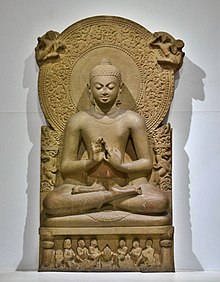Samaññaphala Sutta
Appearance

The Samaññaphala Sutta is the second discourse of the Digha Nikaya.
Quotes
[edit]- 'Suppose there were a man, a slave, a labourer, getting up before you and going to bed after you, willingly doing whatever has to be done, well-mannered, pleasant-spoken, working in your presence. And he might think, ... "I ought to do something meritorious. Suppose I were to shave off my hair and beard, don yellow robes, and go forth from the household life into homelessness!" And before long, he does so. And he, having gone forth might dwell, restrained in body, speech and thought, satisfied with the minimum of food and clothing, content, in solitude. And then if people were to announce to you: "Sire, you remember that slave who worked in your presence, and who shaved off his hair and beard and went forth into homelessness?" ... Would you then say: "That man must come back and be a slave and work for me as before?"'
'No indeed, Lord. For we should pay homage to him, we should rise and invite him and press him to receive from us robes, food, lodging, medicines for sickness and requisites, and make arrangements for his proper protection.'
- M. Walshe, trans. (1987), verses 35-36, pp. 97-98
- As long, Sire, as a monk does not perceive the disappearance of the five hindrances in himself, he feels as if in debt, in sickness, in bonds, in slavery, on a desert journey. But when he perceives the disappearance of the five hindrances in himself, it is as if he were freed from debt, from sickness, from bonds, from slavery, from the perils of the desert.
- M. Walshe, trans. (1987), verse 74, p. 102
- It is just as if a man were to draw out a reed from its sheath. He might think: “This is the reed, this is the sheath, reed and sheath are different. Now the reed has been pulled from the sheath.” … In the same way a monk with mind concentrated directs his mind to the production of a mind-made body. He draws that body out of this body.
- M. Walshe, trans. (1987), verse 86, p. 104

